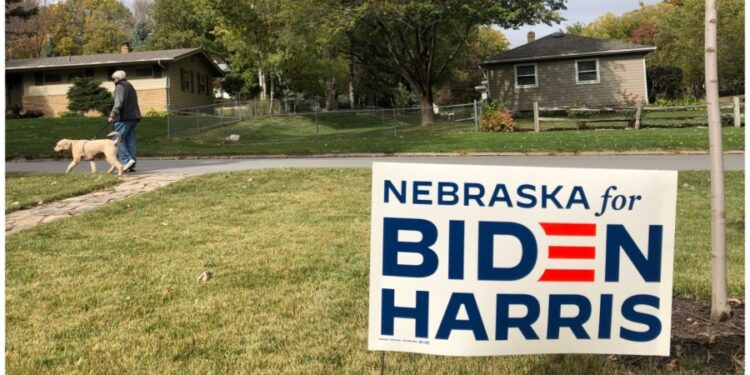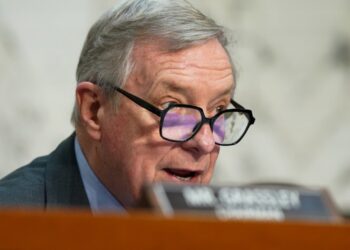
(NewsNation) — Omaha, Nebraska, is punching far above its weight class politically thanks to a unique way of assigning electoral votes that could play a key role in the upcoming election.
Omaha is the home of Kool-Aid, the frozen TV dinner and Marlon Brando, the epicenter of baseball and a city with history.
During World War II, a Japanese balloon bomb exploded in the air just a few miles from what is now Charles Schwab Field.
Nebraska has an unorthodox way of awarding presidential electors, departing from the winner-take-all model used by almost all states.
Two of the state’s electoral votes go to the statewide winner and the winner in each congressional district gets one elector.
Now, Nebraska is a reliably red state, but its 2nd Congressional District, which includes Omaha, can and does go blue. That’s earned it the nickname the “blue dot.”
The importance of Omaha isn’t lost on the campaigns, with both Vice President Kamala Harris and former President Donald Trump on the ground in the area early, a clue they both feel that it could be crucial in what is shaping up to be a nail-biter election.
The oversized role of Nebraska’s 2nd District has put the home of the College World Series in the spotlight for a very different reason.
NewsNation brought together voters from the diverse district, where party lines prevailed when it came to how people felt about the system.
Republicans want the state to go back to a winner-take-all system.
“I think it’s us and Maine are the only two states that give up the congressional districts to separate them,” said Tony Connor. “I think there should be consistency in every state. So I would like to see some consistency.”
On the other side of the aisle, many Democrats like that the state legislature has stood up to GOP efforts to roll back Nebraska’s system of awarding electors.
“I don’t believe in winner-take-all. I don’t think it matches the people’s choice as well as it should,” said Jean Couchey. “I think there’s too many enclaves within the state that are not represented by that.”
The district is not defined by being a blue dot alone.
Where Interstate 80 runs just south of downtown, registered Republicans outnumber Democrats.
“We’re on I-80. We’re right in the middle of the country, and there’s a lot of trafficking that comes right through her,” said Colleen Brennan. “Human trafficking is a big problem. Drug trafficking is a huge problem.”
One issue that sparks debate? Immigration.
“[My] first language was Spanish,” said Dulce Sherman. “I learned English. I’m successful. I mean, I’m the example that not all people that come from immigrants are bad people.”
The diverse opinions reflect the bigger conversations across the nation.
“In many respects, this district becomes a microcosm of society,” said Randy Adkins.
Adkins is a professor at the University of Nebraska, Omaha, where he teaches campaigns and elections.
He’s happy to see the nation learning about how the Cornhusker State handles the race for the White House.
“I think it is unique. I think it is more democratic, with a small ‘D,’ in the sense that even the minority is represented somehow in the state, in the Electoral College vote, which doesn’t happen in 48 out of 50 states,” he said. “Or at least there’s a possibility of that.”
Like the rest of the nation, diverse views can, at times, result in heated debate, especially on controversial issues like abortion.
“My grandchildren, I want the ability for them to have a say in my body, my right to decide what I do with my body,” Dulce Sherman said.
Another voter disagreed.
“It’s not their body, it’s not their choice,” said William Duerr. “That body is a separate entity, a separate human being.”
Still, the state has a strong sense of community bolstered by smart, civil discussion as voters cast their ballots to see exactly how Nebraska’s unique electoral system will play out in 2024.






